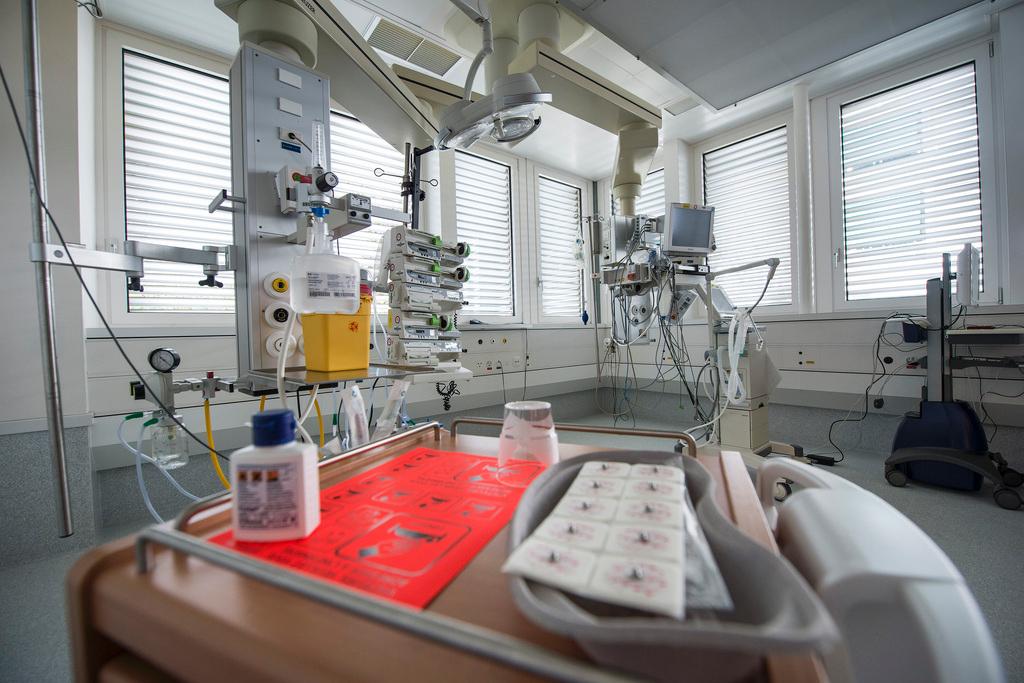
Geneva prepares for limited Ebola cases

The risk of Ebola spreading to Switzerland is very low, stress officials. Yet facilities like Geneva University Hospital are readying themselves for limited numbers of potential Ebola patients.
“I’m putting the patient’s dirty shirt carefully inside this yellow plastic bag. They’re not the usual 35-litre rubbish bags but ‘Swiss test compatible’. They’re solid and cannot be punctured easily.”
Pierre Brennenstuhl closes the top of the yellow bag and places it inside a second one.
“This is then closed, disinfected and put inside this yellow container which is sealed and again disinfected and passed to the colleague in the other room where the process is repeated before it is incinerated.”
The demonstration of how to deal with Ebola-infected clothing is just an exercise – for journalists.
Inside the gleaming-white Ebola isolation unit deep within Geneva University Hospital, Brennenstuhl, responsible for hospital safety, explains the intensive care set-up and describes in detail how health workers will look after patients and protect themselves accordingly.
The containment room, which has a special air-locked double-door system and air conditioning, is part of the hospital’s intensive care department for dealing with highly infectious conditions such as measles or tuberculosis.
Geneva University Hospital is one of 12 Swiss hospitals that have been selected to deal with potential Ebola cases in Switzerland. The facility is able to handle a maximum of two patients but currently stands empty.
“The epidemic remains centred on Guinea, Sierra Leone and Liberia, and in these last two countries it’s still in an upwards phase with between ten and 100 new cases a day. The mortality rate is terrifying at around 70%,” explained Laurent Kaiser, head of the Geneva University Hospital infectious diseases department and the virology laboratory. Ebola has already killed more than 4,500 people.
Keep calm
Geneva officials stress that the Swiss public should not panic, adding that a unit for two patients will suffice.
“Fifteen people infected from the region have been repatriated to either Europe or the US, mainly NGO or international organisation staff. The mortality rate is doubtless lower than in Africa but still extremely high,” Kaiser said.
“But it is very improbable that the virus will spread in our country. Transmission is not airborne but through close contact. It’s very unlikely that it can mutate from person to person to create hundreds or thousands of cases.”
On its website the Federal Office of Public Health adds that the risks of asylum-seekers or travellers from the affected countries bringing the virus to Switzerland are “almost nil”, as they are either likely to fall ill before arriving or be checked before leaving Africa by plane or on arrival in Europe.
“There is starting to be a bit of an obsession about Ebola,” explained Jacques-André Romand, chief doctor of canton Geneva. “Our main concern in canton Geneva is to identify suspect patients as fast as possible and to ensure the safety of health workers.”
Since the beginning of the crisis a dozen suspect Ebola cases have been identified in Switzerland but subsequently dismissed after negative tests at Geneva University Hospital, which has been designated as the main Swiss centre for Ebola tests.
According to the health office, a person is considered suspect if they have a temperature above 38 degrees Celsius and have travelled to one of the three main affected African countries in the 21 days prior to the start of the symptoms – the virus incubation period.
In this event, a special process is set in motion. If they live close to Geneva, the patient and doctor are given a mask, isolated and transported to Geneva University Hospital in a special ambulance. The same procedure is in place for patients repatriated to Switzerland.
Labour intensive
Nevertheless, taking care of Ebola patients remains extremely dangerous and labour intensive and in Geneva they have been taking additional measures.
Each patient requires a team of three health workers, including one who must supervise the dressing and undressing of their colleagues to prevent any accidental contagion (see video below).

More
Geneva hospital staff prepare for Ebola
The undressing is the most delicate phase with a strict 27-point checklist, Brennenstuhl explained. Given the stressful environment and difficult working conditions, two or three teams will be needed for each patient.
In preparation, Geneva University Hospital has been increasing training sessions for its staff and spent CHF200,000 ($210,000) on protection material and additional human resources.
As well as its special measures for looking after possible Ebola patients, Geneva University Hospital is involved in efforts to find a vaccine to fight the Ebola epidemic.
On October 22 the first shipment of an experimental vaccine from Canada arrived in Geneva. Some 250 vials out of a total of 800 are being stored at the Geneva University Hospital. The British company Glaxosmithkline is developing a second experimental vaccine.
In collaboration with the WHO, Geneva University Hospital and Lausanne University Hospital plan to carry out a series of protocol tests to validate the safety of the vaccine in humans, and if the results are conclusive, to test their effectiveness. The validation and testing will take months, say officials, but the normal process will be shortened given the urgency.

In compliance with the JTI standards
More: SWI swissinfo.ch certified by the Journalism Trust Initiative


























You can find an overview of ongoing debates with our journalists here . Please join us!
If you want to start a conversation about a topic raised in this article or want to report factual errors, email us at english@swissinfo.ch.